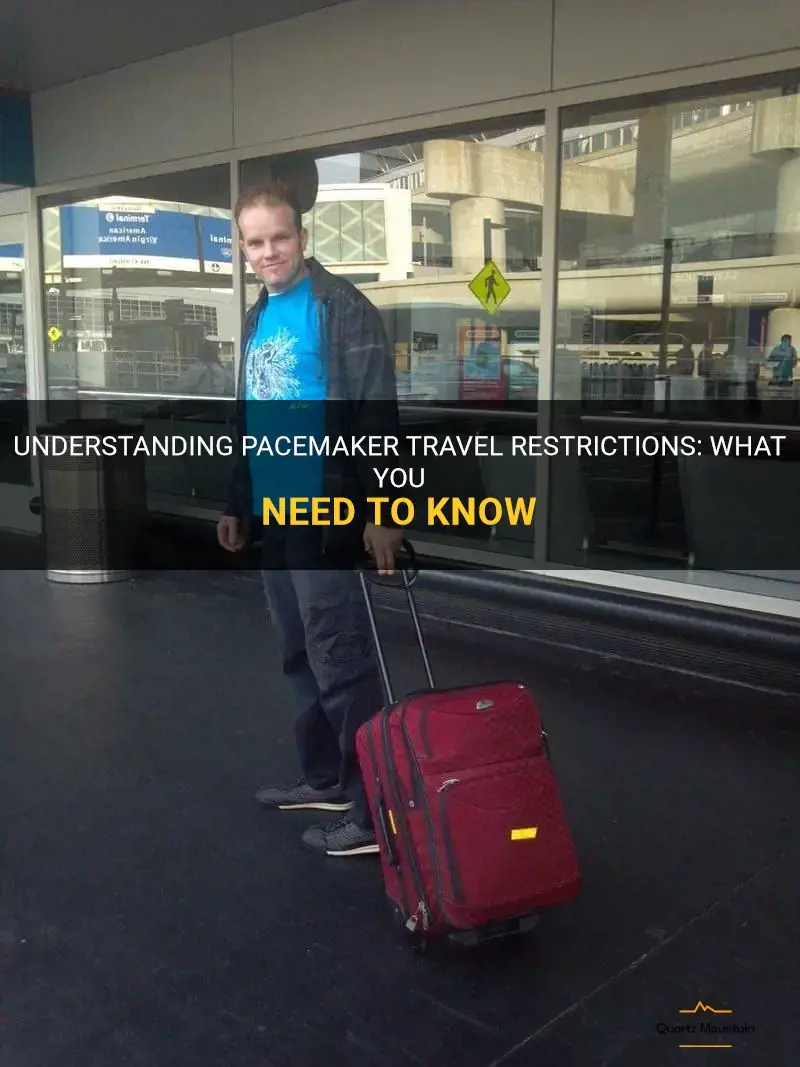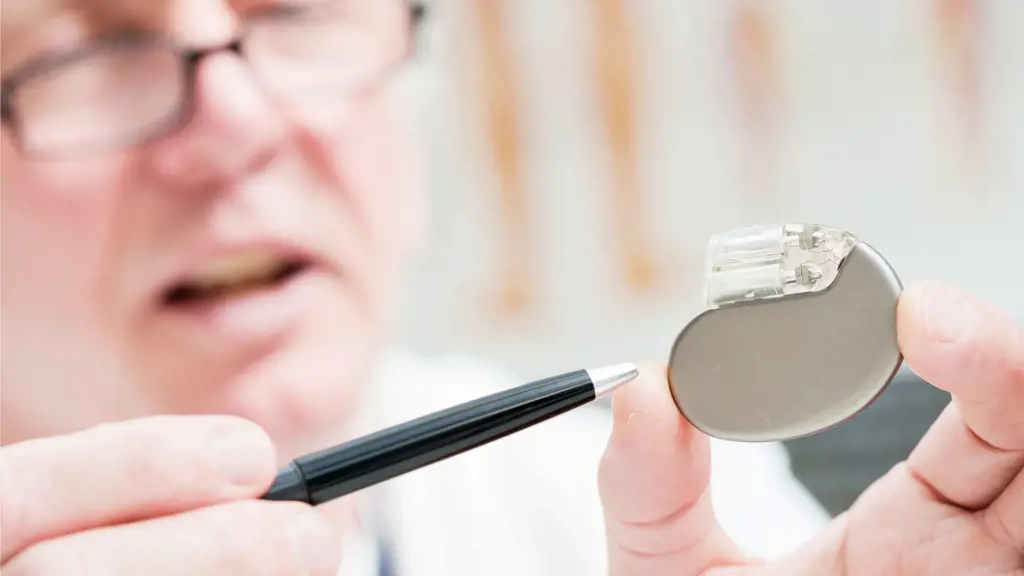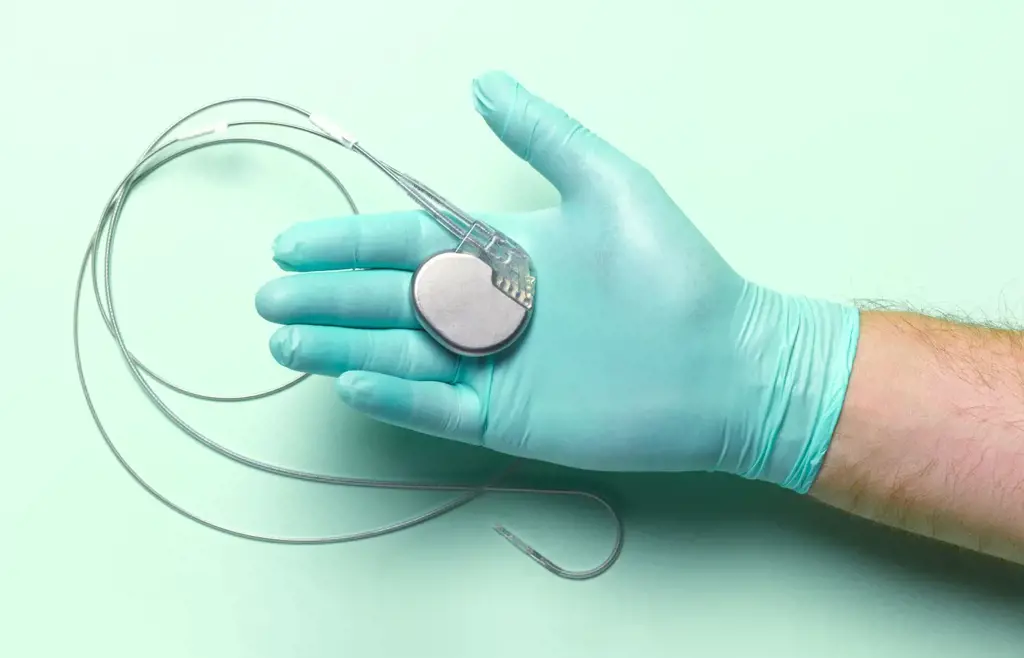
Did you know that having a pacemaker may limit your ability to travel to certain places? While pacemakers are essential medical devices that help regulate the heart's rhythm, they can also come with travel restrictions. Whether it's airport security, electromagnetic interference, or medical care availability, pacemaker wearers need to be aware of these limitations before embarking on their next adventure. So, join us as we explore the various travel restrictions faced by those with pacemakers - you might be surprised by what you learn!
What You'll Learn
- Are there any specific travel restrictions for individuals with a pacemaker?
- Can individuals with pacemakers travel by airplane?
- Are there any precautions or considerations individuals with pacemakers should take when traveling?
- Are there specific guidelines for individuals with pacemakers when traveling to countries with different electrical systems?
- Are there any limitations or restrictions for individuals with pacemakers when participating in certain activities or sports while traveling?

Are there any specific travel restrictions for individuals with a pacemaker?

Traveling can be an exciting experience, but for individuals with a pacemaker, there may be some specific travel restrictions to consider. A pacemaker is a small device that is implanted near the heart to help regulate the heartbeat. It is an important tool for individuals with certain heart conditions, but it may require some extra precautions when traveling.
One important consideration for individuals with a pacemaker is passing through security at airports. The electromagnetic fields generated by security scanners can potentially interfere with the functioning of the pacemaker. However, most modern pacemakers are designed to be safe around these types of scanners. It is always a good idea to inform the security personnel that you have a pacemaker so that they can provide any necessary accommodations. You may be asked to bypass the scanner and undergo a pat-down instead.
It is also important to take extra care when handling luggage and other heavy items. Avoid carrying heavy bags or lifting heavy objects with the arm on the side of the pacemaker. This can help prevent any strain or accidental damage to the pacemaker device. It is also a good idea to avoid prolonged exposure to strong magnetic fields, such as those found in some medical imaging equipment or certain metal detectors. If you have any concerns about specific activities or situations, it is always best to consult with your healthcare provider.
When traveling internationally, it is important to carry a copy of your pacemaker identification card or medical device passport. This document provides information about the type of pacemaker you have and can be useful in the event of an emergency or if you need medical assistance while abroad. It is also a good idea to have a list of your medications and emergency contacts with you at all times.
If you are planning a trip to a remote or rural area, it is important to consider the availability of medical facilities. Make sure to research the location and ensure that there are adequate healthcare facilities nearby. It may also be beneficial to inform your travel companions about your pacemaker and any necessary precautions they should be aware of.
In conclusion, while individuals with a pacemaker can still enjoy traveling, there are some specific restrictions and considerations to keep in mind. It is important to inform security personnel about the pacemaker, take care when handling heavy objects, and be mindful of any potential magnetic fields. Carrying appropriate identification and being prepared with necessary information can also help ensure a safe and enjoyable trip. As always, consult with your healthcare provider for personalized advice and guidance.
Exploring Oslo: Navigating Norway's Travel Restrictions
You may want to see also

Can individuals with pacemakers travel by airplane?

Traveling can be an exciting experience, but for individuals with pacemakers, it may also raise concerns about the safety and potential risks involved. However, with proper precautions and awareness, individuals with pacemakers can indeed travel by airplane without major issues. In this article, we will explore the steps and measures to ensure a safe and comfortable journey for these individuals.
First and foremost, it is crucial for individuals with pacemakers to consult their healthcare provider before planning any trip. This step is vital as the doctor can assess their overall health condition and provide specific guidance based on individual needs. The healthcare provider may also check the pacemaker settings and ensure they are appropriate for air travel.
Additionally, individuals with pacemakers should inform the airline about their medical condition prior to the flight. Airlines have policies and procedures in place to accommodate passengers with medical devices, including pacemakers. By notifying the airline in advance, individuals can receive the necessary assistance and ensure a smooth experience during the journey.
During the flight itself, individuals with pacemakers should take certain precautions to minimize any potential risks. It is important to avoid placing electronic devices, such as laptops or mobile phones, directly over the pacemaker site, as these devices may interfere with the pacemaker's functioning. Additionally, it is advisable to keep a safe distance from airport security metal detectors and request a manual pat-down instead.
It is also recommended for individuals with pacemakers to carry their pacemaker identification card or a letter from their doctor. These documents can provide necessary information and ensure efficient communication with the airport security staff, simplifying the screening process.
Furthermore, it is essential to stay hydrated during the flight by drinking plenty of water. The dry air in the airplane cabin can increase the risk of dehydration, which may affect the overall well-being of individuals with pacemakers. Therefore, it is important to consume an adequate amount of water throughout the journey.
Lastly, individuals with pacemakers should be aware of potential signs or symptoms that may require immediate medical attention during the flight. These signs may include dizziness, chest pain, palpitations, or shortness of breath. In such cases, individuals should alert the flight attendants and ask for medical help if necessary.
In conclusion, individuals with pacemakers can travel by airplane without major issues by taking certain precautions and contacting their healthcare provider for specific guidance. By informing the airline about their medical condition in advance and following the recommended safety measures during the flight, individuals can ensure a safe and comfortable journey. It is always important to prioritize one's health and take necessary steps to minimize any risks associated with air travel.
Latest Updates on Ghana Travel Restrictions
You may want to see also

Are there any precautions or considerations individuals with pacemakers should take when traveling?

If you have a pacemaker, it is important to take certain precautions and considerations when traveling to ensure your health and well-being. Here are some key tips to keep in mind:
- Inform your healthcare provider: Before embarking on your trip, make sure to inform your healthcare provider about your travel plans. They can provide you with necessary information and precautions specific to your condition and help you make an informed decision about traveling.
- Carry important documents: It is crucial to have important documents with you at all times. Make sure to carry your pacemaker identification card, which contains information about your device, the date it was implanted, and other relevant details. This card can be essential in case of an emergency or if you need medical assistance while traveling.
- Bring extra supplies: It is a good idea to carry extra pacemaker supplies, such as spare batteries and leads, with you during your trip. This way, you can handle any unexpected situations that may arise, such as battery failure or lead damage. It is also important to keep these supplies in your carry-on bag to prevent damage or loss.
- Be cautious of security devices: When passing through airport security checkpoints, inform the security personnel about your pacemaker. Most modern pacemakers are shielded and designed to withstand routine security screenings. However, it is recommended to avoid metal detectors and instead opt for a manual pat-down or a screening with a handheld wand. Remember to avoid standing near or passing through metal detectors for an extended period, as the magnetic field may temporarily affect your pacemaker's function.
- Avoid strong electromagnetic fields: Pacemakers are sensitive to electromagnetic fields, so it is essential to avoid strong sources of electromagnetic radiation. Common sources of electromagnetic fields include MRI machines, industrial equipment, and certain electrical devices. It is important to be aware of your surroundings and stay away from any potential sources of electromagnetic interference.
- Plan your accommodations carefully: When choosing accommodations, consider the availability of medical facilities nearby. Having access to medical assistance in case of an emergency can provide peace of mind while traveling. Additionally, ensure that your hotel room has a landline telephone as it can be more reliable than a cell phone in case of an emergency.
- Stay hydrated and monitor your health: Traveling can be physically demanding, so make sure to stay hydrated and listen to your body. Take frequent breaks, especially during long flights or road trips, and avoid excessive physical exertion. It is also recommended to monitor your heart rate and overall health regularly, paying attention to any unusual symptoms or changes.
- Inform fellow travelers and travel companions: It is advisable to let your fellow travelers and travel companions know about your pacemaker. Educate them about your condition and what to do in case of an emergency. This way, they can assist you if needed and be aware of any special considerations that may be necessary during your trip.
Remember, these tips are general guidelines, and it is crucial to consult with your healthcare provider before making any travel plans. They can provide you with personalized advice and ensure that you have all the necessary information to travel safely with a pacemaker. By taking appropriate precautions and being well-prepared, you can enjoy your travel experiences while keeping your health a top priority.

Are there specific guidelines for individuals with pacemakers when traveling to countries with different electrical systems?

For individuals with pacemakers who are traveling to countries with different electrical systems, it is important to take certain precautions and follow specific guidelines to ensure the proper functioning and safety of the device. Pacemakers are implanted medical devices that help regulate the heart's electrical rhythm. These devices rely on electrical impulses to function, so it is crucial to take measures to prevent any disruption or damage while traveling.
One of the main concerns when traveling to countries with different electrical systems is the variation in voltage and frequency. Different countries have different standards for their electrical systems, with variations in voltage ranging from 110 V to 240 V and frequencies ranging from 50 Hz to 60 Hz. These differences can pose a risk to the proper functioning of pacemakers if not addressed adequately.
To ensure the safety of the pacemaker, here are some guidelines to follow:
- Consult your cardiologist: Before traveling, it is important to consult your cardiologist and inform them about your travel plans. They can provide specific advice based on your individual medical history and the type of pacemaker you have.
- Research the electrical standards of your destination: Find out the voltage and frequency of the electrical system in the country you are traveling to. This information can usually be found online or by contacting the local embassy or consulate. Different regions within the same country may also have different electrical standards, so it is important to be specific about your destination.
- Purchase a voltage converter: If the voltage in the country you are traveling to is different from what your pacemaker requires, you will need to use a voltage converter. A voltage converter is a device that allows you to convert the electrical power from the local system to match the requirements of your pacemaker. It is important to choose a reliable voltage converter that is compatible with your device.
- Carry extra batteries: It is always a good idea to carry extra batteries for your pacemaker when traveling. In case of unforeseen circumstances or delays, having spare batteries can ensure that your pacemaker continues to function properly. Make sure to consult your pacemaker manufacturer or your cardiologist to determine the appropriate type and number of spare batteries to carry.
- Carry documentation: When traveling with a pacemaker, it is crucial to have proper documentation to explain the presence of the device. Carry a letter from your cardiologist stating the medical necessity of the pacemaker, as well as any other relevant medical information. This documentation can help expedite security checks at airports and border crossings.
- Be aware of electromagnetic sources: Pacemakers can be affected by electromagnetic fields generated by certain electronic devices. Avoid placing your pacemaker in close proximity to devices such as cell phones, tablets, metal detectors, and powerful magnets. It is also advisable to keep a safe distance from equipment such as welding machines and heavy-duty electrical machinery.
- Take precautions during air travel: Airports and airplanes have various electronic equipment that may interfere with pacemakers. It is generally safe to go through airport security, as long as you notify the security personnel about your pacemaker. However, it is recommended to request a manual pat-down instead of walking through the metal detectors or full-body scanners. Also, avoid placing your pacemaker too close to the airplane's cockpit, as it may be exposed to higher levels of electromagnetic interference.
- Stay connected with your medical team: Keep in touch with your cardiologist or medical team while traveling, especially if you experience any symptoms or concerns related to your pacemaker. They can provide further advice and guidance based on your specific situation.
Traveling to countries with different electrical systems can be a rewarding experience, but it is important to prioritize the safety and functioning of your pacemaker. By following these guidelines and consulting with your medical team, you can ensure a smooth and worry-free trip while keeping your pacemaker in optimal condition.
Navigating Denpasar: Travel Restrictions and Tips for a Safe Trip
You may want to see also

Are there any limitations or restrictions for individuals with pacemakers when participating in certain activities or sports while traveling?

Pacemakers are medical devices implanted into the chest to help regulate abnormal heart rhythms. They are commonly used to treat conditions such as bradycardia (slow heart rate) or other heart rhythm disturbances. While pacemakers have greatly improved the quality of life for many people, there are some limitations and restrictions that individuals with pacemakers may need to be aware of when participating in certain activities or sports while traveling.
One of the main concerns for individuals with pacemakers is electromagnetic interference (EMI). EMI can occur when the pacemaker comes into contact with certain electronic devices or equipment that generate electromagnetic fields, such as metal detectors, MRI machines, or even security systems at airports. These electromagnetic fields can interfere with the normal functioning of the pacemaker, potentially causing it to malfunction or misinterpret signals from the heart.
To reduce the risk of EMI, individuals with pacemakers should inform airport security personnel about their condition before going through metal detectors. They may be asked to undergo an alternative screening method, such as a pat-down or a handheld metal detector. It is also important to carry the pacemaker identification card provided by the manufacturer, which contains relevant information about the device and its settings.
In addition to airport security, individuals with pacemakers should also be cautious when participating in certain activities or sports. Contact sports and activities that involve a high risk of injury or falling, such as football, rugby, or rock climbing, may not be recommended for individuals with pacemakers. The physical impact or trauma to the chest during these activities could potentially damage the pacemaker or lead wires, requiring surgical repair or replacement.
Similarly, activities that involve intense magnetic fields or radiofrequency exposure, such as magnetic resonance imaging (MRI) or welding, should be avoided unless specifically approved by a healthcare professional. These procedures can generate strong electromagnetic fields that can interfere with the functioning of the pacemaker.
However, it is important to note that many individuals with pacemakers can still enjoy an active lifestyle and participate in moderate activities such as walking, swimming, golf, or cycling. These activities pose minimal risk of chest trauma or EMI and can help improve overall cardiovascular health.
To ensure a safe travel experience, individuals with pacemakers should consult with their healthcare provider before embarking on any travel plans. The healthcare provider can provide specific guidelines based on the individual's medical history and the type of pacemaker they have implanted. They may also recommend periodic follow-up visits to assess the pacemaker's functioning and make any necessary adjustments.
In conclusion, while there are some limitations and restrictions for individuals with pacemakers when participating in certain activities or sports while traveling, many can still enjoy an active lifestyle with proper precautions. Informing airport security about the pacemaker, avoiding contact sports or activities with a high risk of injury, and consulting with a healthcare provider before traveling can help ensure a safe and enjoyable trip for individuals with pacemakers.
Understanding the Travel Restrictions on the Forth Road Bridge
You may want to see also
Frequently asked questions
Generally, individuals with a pacemaker are able to travel without any restrictions. However, it is recommended to check with their doctor before making any travel arrangements, especially if they will be traveling long distances or to remote locations.
Yes, individuals with pacemakers can go through airport security. It is important to inform the security personnel about the pacemaker before going through the metal detector or undergoing any additional screening. They may ask for additional documentation or perform a pat-down search instead.
While traveling with a pacemaker, it is important to avoid strong magnetic fields, such as those found in magnetic resonance imaging (MRI) machines or metal detectors. It is also recommended to carry a pacemaker identification card and keep a list of emergency contact numbers.
Most individuals with pacemakers can travel to high-altitude locations without any issues. However, it is recommended to consult with a doctor prior to traveling to such locations, as altitude changes can affect pacemaker function and may require some adjustments to the device settings.
Generally, using electronic devices such as laptops, tablets, or cell phones is safe for individuals with pacemakers. However, it is always best to keep electronic devices at least six inches away from the pacemaker to avoid any potential interference. It is also recommended to turn off devices that generate strong electromagnetic fields, such as induction cooktops or power tools, to minimize the risk of interfering with the pacemaker.







